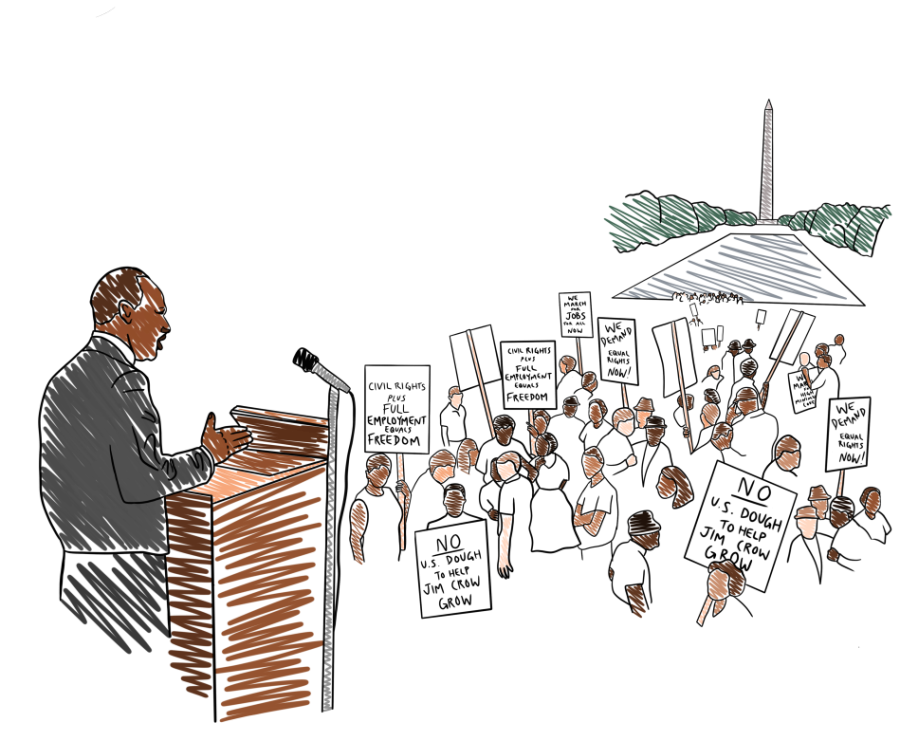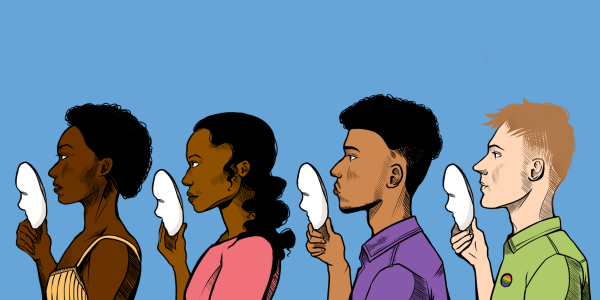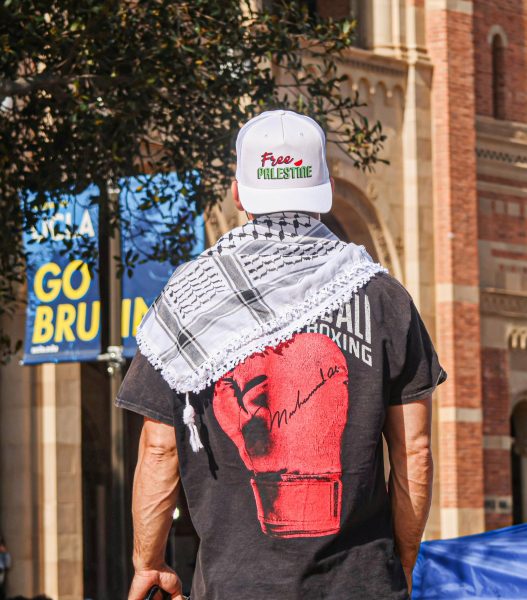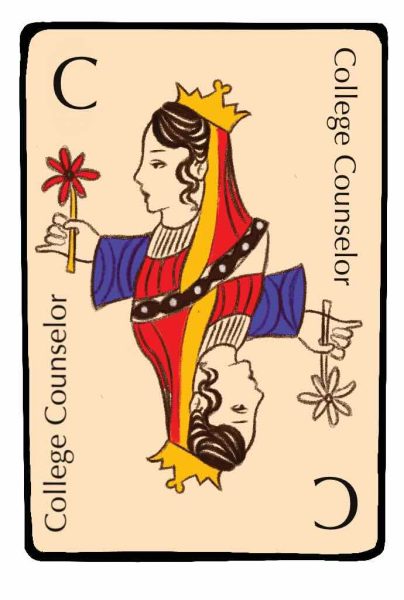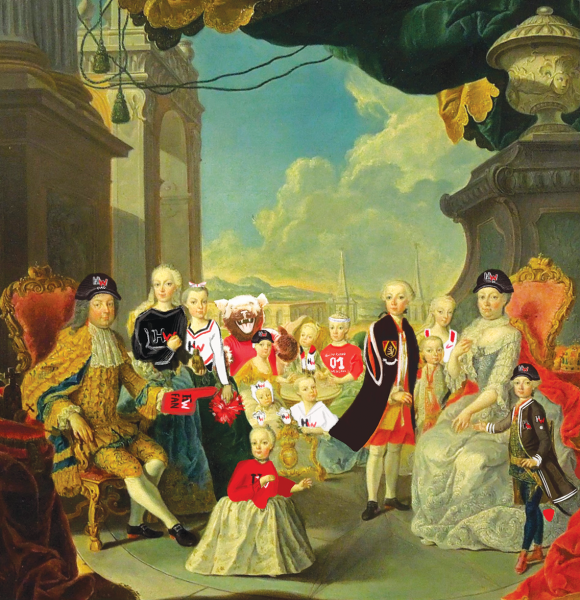Marching Forward
Community members reflect on the modern-day implications of Dr. Martin Luther King Jr.’s message and activism.
Illustration by Alexa Druyanoff
Dr. Martin Luther King Jr. gives his “I Have a Dream” speech to sign-bearing protesters at the March on Washington.
Voicing their demands as they strode across the National Mall, roughly 250,000 people raised signs to protest racial discrimination and lobby for civil rights legislation on August 28, 1963. Attendees were packed tightly between the Washington Monument and Lincoln Memorial as speakers and musicians lent their voices to the cause. The crowd at the March on Washington then hushed as Dr. Martin Luther King Jr. took the stage. King’s remarks, now known as his “I Have a Dream” speech, implored listeners to hold America accountable to its founding promises: life, liberty and the pursuit of happiness. A symbol of the civil rights movement, King is honored each January on a national holiday established in 1983 and has become a staple of American school curricula.
As a Black student, Chris Spencer ’23 said he feels King’s holiday is important for schools to teach and commemorate. Spencer said he is grateful for King’s accomplishments and the impact they have had on the rights of Black Americans.
“To me, Martin Luther King Jr. Day is a moment to celebrate the life of [King] and everything he has achieved for the civil rights movement,” Spencer said. “He helped create change that allowed people like me to integrate into society, which is why the holiday is so important to me.”
In recent years, King’s words have been reexamined in the context of the Black Lives Matter (BLM) movement and after the killings of individuals such as George Floyd and Breonna Taylor. Some conservative commentators and politicians have suggested that King would not have approved of BLM’s calls for reimagining the policing and justice systems. For example, former Vice President Mike Pence refused to speak the words “Black lives matter” in a 2020 CBS News interview, citing his respect for King as a justification.
Black Leadership Awareness and Culture Club (BLACC) leader Ash Wright ’22 said statements like Pence’s do not accurately portray King’s belief in confrontational advocacy.
“I feel that [this viewpoint] disacknowledges [King’s] shifting ideology later on in his life, where he and Malcolm X were very much [aligned] on their ideals,” Wright said. “I’m not sure he would be for every iteration of the BLM movement, but he would definitely be for Black liberation movements [as a whole].”
Spencer said since he began learning about the civil rights movement in elementary school, teachers have focused more on King than other Black leaders.
“I feel as though we don’t really learn about all the other huge Black figures who were part of the civil rights movement,” Spencer said. “You mainly just learn about [King] because [educators] feel like he’s all you need to learn about.”
Asian Students in Action (ASiA) leader Julia Im ’23 agreed with Spencer and said while learning about King in elementary school, she was presented with a diluted and depoliticized version of King’s ideas. She said some adults intentionally downplay King’s strong views and gloss over like-minded civil rights leaders.
“I think he was really radical,” Im said. “People cherry-pick his words and take them out of context, but he was a big part of [inspiring] groups like the Black Panthers. Everyone talks about his [‘I Have a Dream’] speech and how he was seen as a perfect, peaceful advocate for Black rights. But obviously, that’s super whitewashed and kind of misses the point.”
Many modern-day supporters of King’s ideals pursue their advocacy through social media; according to a Pew Research Center poll, 54% of young social media users employ these platforms to learn about local organizing.
Im said as activism becomes increasingly digitized, it deviates from the long-term social change King produced during the civil rights movement.
“The very nature of social media makes performativity so accessible,” Im said. “After people post on social media, they think their part in helping social issues is over, when in reality, it just kind of does nothing and trivializes the issue. [I think King] would have wanted material change and concrete change. Petitions are one [way] that can happen, which social media has helped, but in general, the vast majority of posts I’ve seen online are just simple infographics that never contribute anything.”
In addition to opposing racial discrimination, King supported several economic justice initiatives. The 1963 March on Washington centered on policies such as a nationwide $2-an-hour minimum wage and job training for the unemployed, according to NPR. King also opposed the Vietnam War and pressured President Lyndon B. Johnson to take greater action to help alleviate financial crises through his Great Society legislation. Junior Prefect Simon Lee ’23 said these economic and social aspects of King’s platforms are often overlooked.
“We forget about how [King] fought for social justice and workers’ rights,” Lee said. “He advocated a lot of revolutionary social concepts. To remember King as a great civil rights warrior without including his deep commitment to economic justice and workers’ rights, as evidenced by his revolutionary rhetoric and alliances with many powerful labor groups, does a disservice to his legacy and the legacy of the ongoing fight for justice.”
Lee said there are direct parallels between King’s protest tactics and those used by protesters of modern-day police brutality.
“I think a lot of the tactics that were employed in the [1965 Selma Marches] and Montgomery Bus Boycott can definitely be studied in regards to how people choose to approach issues of police brutality and the murder of Black people by the state,” Lee said.
King’s advocacy promoted the passage of the Civil Rights Act of 1964 and Voting Rights Act (VRA) of 1965. As voting rights have persisted as an issue in contemporary politics, the Supreme Court struck down key provisions of the VRA in 2013, and more than 440 bills restricting voting access were introduced in 49 states’ 2021 legislative sessions, according to the Brennan Center for Justice. Wright said she believes contemporary voter suppression efforts are antithetical to King’s message and represent the barriers he spent his life combating.
“I think there is still a fight that needs to be continued regarding voting rights,” Wright said. “King would highlight the fact that there is a Black vote now, but there are also many efforts to prevent that. Just because [Black people] are allowed to vote doesn’t necessarily mean we are able to vote, which is equally as bad.”
Noah Nakayama ’23 said despite the recent rise in anti-racist activism, he has yet to learn about King’s holiday at the school. Nakayama said there is a missed opportunity to include the significance of this yearly celebration in the school’s curricula.
“Personally, I haven’t been in contact with many activities surrounding [Martin Luther King Jr.] Day over the years,” Nakayama said. “I think [the school] can easily work in some content about the holiday, maybe in a history class period. It doesn’t have to be that much.”
Head of Diversity, Equity and Inclusion (DEI) Janine Jones said although she is not aware of any school events celebrating the holiday this year, she would support future efforts to do so.
“I don’t know of any [King] celebrations that the school has sponsored other than an annual debate tournament [on the holiday],” Jones said. “I would be in full support of school-wide celebrations of [the holiday]. I know the DEI Instagram posted something, but I also realize that is a very small acknowledgment.”
With regard to education about King and civil rights, Jones said the school has recently changed history courses to dedicate more class time for discussing the movement.
“I think [History Teacher Christopher Clement] has done an amazing job with the U.S. History curriculum since he took over,” Jones said. “I was actually speaking with him [recently], and he said 11th graders are starting the civil rights movement [in January] and that it will probably last until spring break. We were discussing bringing a filmmaker to campus who recently produced a provocative documentary on the civil rights movement.”
Darcey O’Brien ’23, who moved to the United States from Australia at age eight, said King’s movement has had an international impact on her by inspiring conversations about race overseas. O’Brien said that Australia’s massacre of Aboriginal Australians, an issue dating back to the 18th century, has now been brought to light due to movements King inspired.
“I’d say [Australia] is still far behind in its ideals,” O’Brien said. “After BLM protests in Australia last year, bigger issues started coming up about Aboriginal history and the genocide that happened in Australia with Aboriginal people and indigenous people. But I feel, before 2020, people didn’t know about these issues. I think [King] led the way; he created a space to help fight.”

































